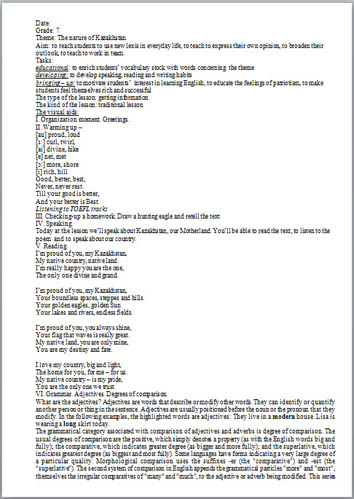Aim: to teach students to use new lexis in everyday life, to teach to express their own opinion, to broaden their outlook, to teach to work in team.
Tasks:
educational: to enrich students’ vocabulary stock with words concerning the theme
developing: to develop speaking, reading and writing habits
bringing – up: to motivate students’ interest in learning English, to educate the feelings of patriotism, to make students feel themselves rich and successful
The type of the lesson: getting information
The kind of the lesson: traditional lesson
І. Organization moment. Greetings.
II . Warming up
[au] proud, loud
[з:] curl, twirl,
[ai] divine, hike
[e] net, met
[ɔː] more, shore
[i] rich, hill
Good, better, best,
Never, never rest.
Till your good is better,
And your better is Best.
Listening to TOEFL tracks
III. Checking-up a homework.
Draw a hunting eagle and retell the text
IV. Speaking.
Today at the lesson we’ll speak about Kazakhstan, our Motherland. You’ll be able to read the text, to listen to the poem and to speak about our country.

VI. Grammar. Adjectives. Degrees of comparison.
What are the adjectives? Adjectives are words that describe or modify other words. They can identify or quantify another person or thing in the sentence. Adjectives are usually positioned before the noun or the pronoun that they modify. In the following examples, the highlighted words are adjectives: They live in a modern house. Lisa is wearing a long skirt today.
The grammatical category associated with comparison of adjectives and adverbs is degree of comparison. The usual degrees of comparison are the positive, which simply denotes a property (as with the English words big and fully); the comparative, which indicates greater degree (as bigger and more fully); and the superlative, which indicates greatest degree (as biggest and most fully). Some languages have forms indicating a very large degree of a particular quality. Morphological comparison uses the suffixes -er (the "comparative") and -est (the "superlative"). The second system of comparison in English appends the grammatical particles "more" and "most", themselves the irregular comparatives of "many" and "much", to the adjective or adverb being modified. This series can be compared to a system containing the diminutives "less" and "least". Fill in the correct form of the words in brackets (comparative or superlative) .
My house is (big) than yours.
This flower is (beautiful) than that one.
This is the (interesting) book I have ever read.
Non-smokers usually live (long) than smokers.
Which is the (dangerous) animal in the world?
A holiday by the sea is (good) than a holiday in the mountains.
It is strange but often a coke is (expensive) than a beer.
VII. Writing.
Write out every single adjective from the poem. Use the correct form of comparison.
Native, happy, divine, boundless, endless, great, big, light.
VIII. Сonsolidation
IX. Conclusion moment.
X. Giving marks and homework.
Translate the poem
Весь материал – смотрите документ.

 Получите свидетельство
Получите свидетельство Вход
Вход












 Разработка урока по английскому языку "The nature of Kazakhstan" (36.5 КB)
Разработка урока по английскому языку "The nature of Kazakhstan" (36.5 КB)
 0
0 774
774 42
42 Нравится
0
Нравится
0


